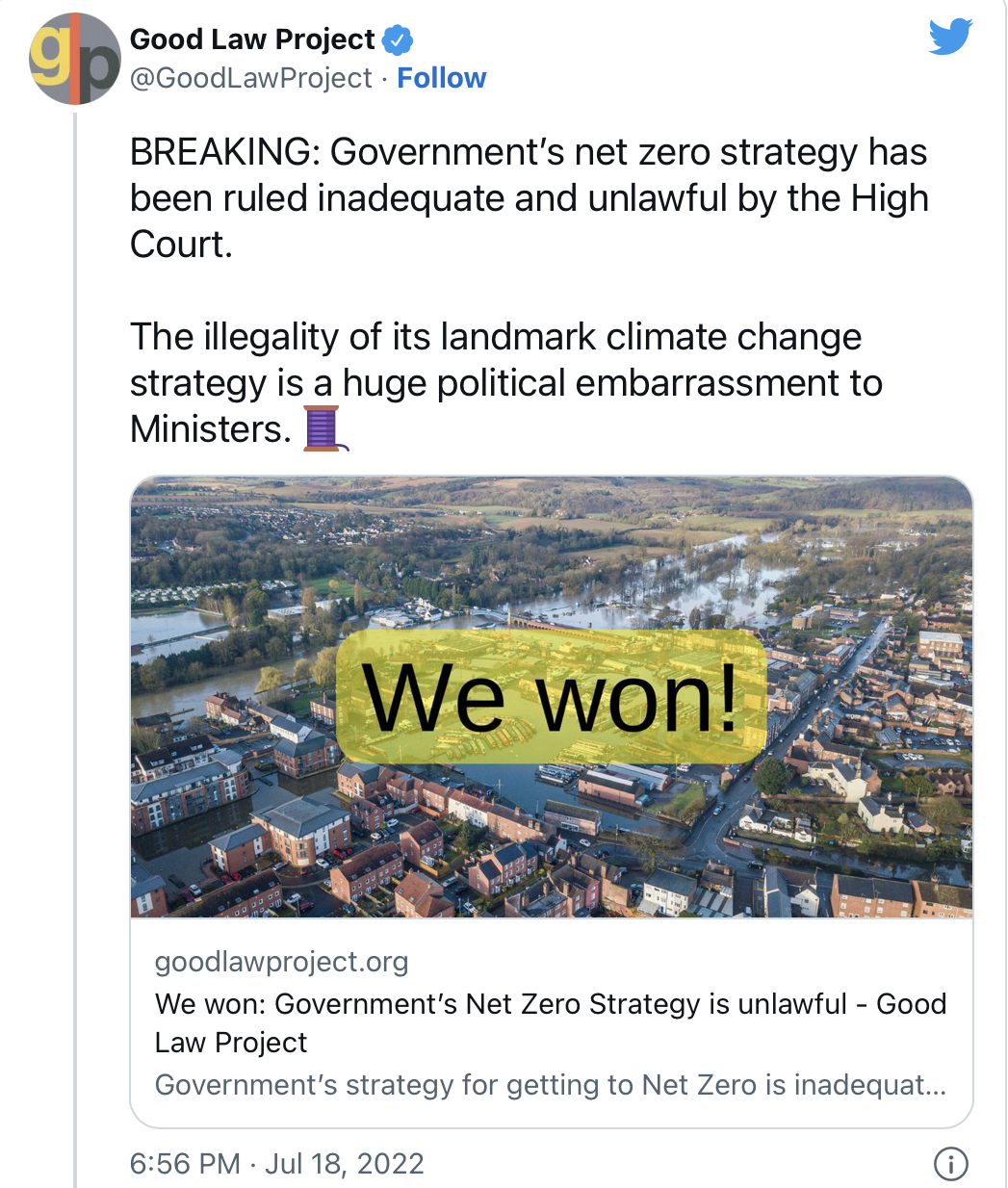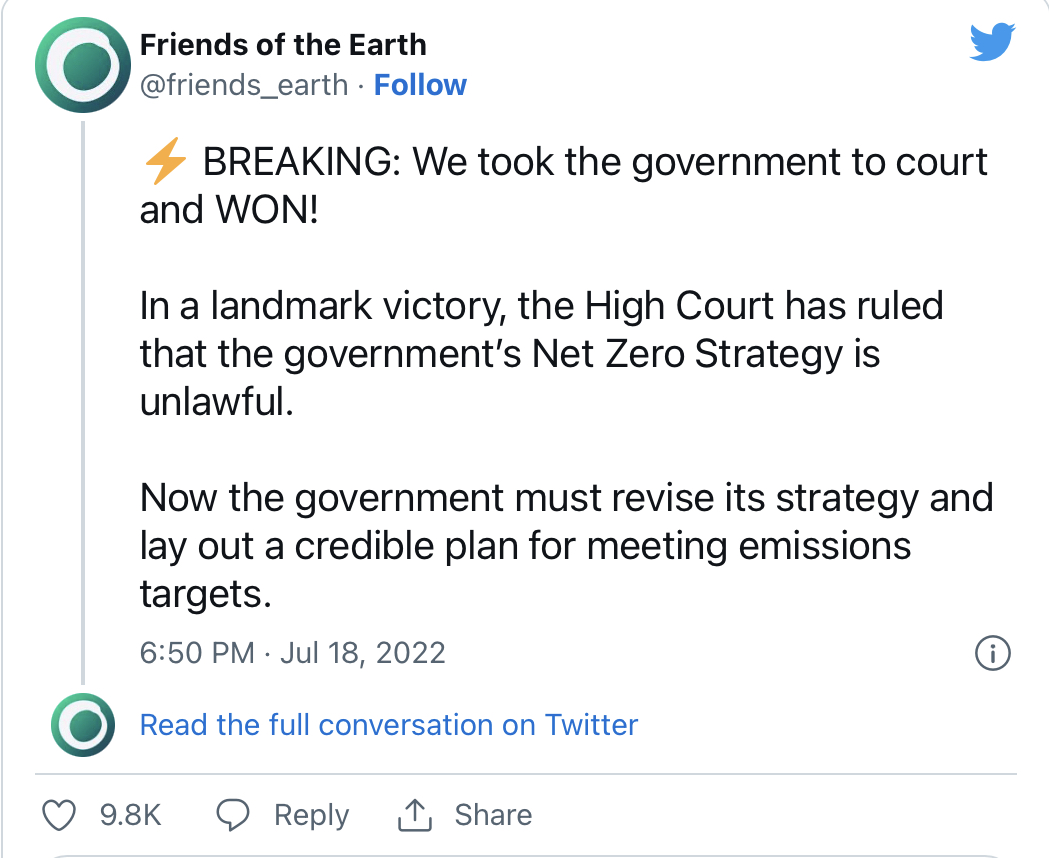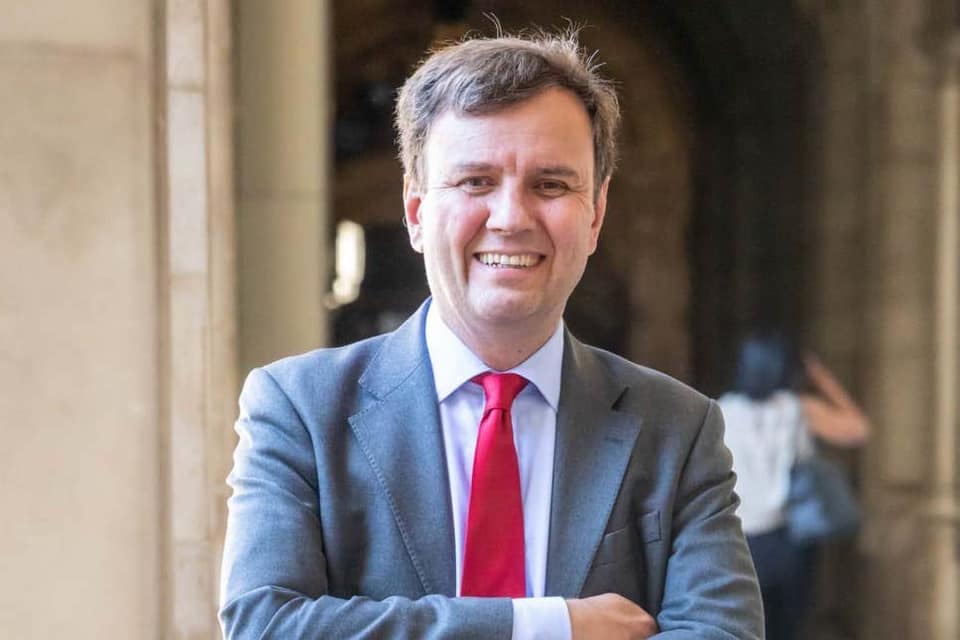
- Sustainable Planet -
- 5mins -
- 252 views
Campaigners hail victory in legal challenge over UK Government’s “unlawful” net zero strategy
The UK’s High Court has found Government strategy for reaching Net Zero is inadequate and unlawful, following a successful legal challenge.
Uk Government net zero proposals deemed “too vague” and “lacked the specificity”
The UK Government’s strategy for reaching Net Zero (carbon emissions) is inadequate and unlawful, the High Court has found, following a successful legal challenge brought by Good Law Project, Joanna Wheatley, Client Earth and Friends of the Earth.
The Climate Change Act requires Government to hit Net Zero by 2050, to make proposals as to how it will meet that target, and to place a report before Parliament.
In a detailed judgment and order published on Monday 18 July 2022 – amid the UK’s first ever red alert for extreme heat – the High Court held that the proposals for achieving Net Zero approved by the Secretary of State were too vague to enable him to be satisfied that the statutory targets would be met. And that the report placed before Parliament lacked the specificity necessary to meet the Secretary of State’s duty to inform Parliament and the public of his plans. — GoodLawProject

More political embarrassment for an already disgraced government
The illegality of its landmark climate change strategy is a huge political embarrassment to the Government. On launch in October 2021 the Net Zero Strategy was hailed by Prime Minister Boris Johnson in a foreword “Our strategy for net zero is to lead the world in ending our contribution to climate change.” And by the Secretary of State, Kwasi Kwarteng: “This strategy demonstrates how the UK is leading by example, with a clear plan for the future.”
The Court has ordered that the existing Strategy be fleshed out with the detail necessary for Parliamentary – and public – scrutiny within the next 8 months. And the Government has been ordered to pay our costs.
The dangerous heatwave this week is a stark reminder of the very real threat we face. UK infrastructure and homes were designed for a climate that no longer exists. This cannot wait. The Net Zero target must be a road map to a sustainable future – not a lie we tell our children.
The Good Law Project say they are thrilled to have worked alongside their friends at Client Earth and Friends of the Earth to deliver this landmark victory. And all are immensely grateful to the legal team of Baker McKenzie and Jason Coppel QC and Peter Lockley of 11 Kings Bench Walk, who worked pro bono or at hugely discounted rates.
Source: GoodLawProject

Government will now have to update its climate strategy
In the ruling on Monday 18 July, Mr Justice Holgate found that Greg Hands, the business secretary at the time the strategy was agreed, was not properly briefed about the effects of individual Government policies on meeting carbon budget targets.
The judge concluded that, while the Business, Energy and Industrial Strategy (BEIS) department had carried out extensive analysis which identified the contributions made by the policies, that information was not included in a briefing to Mr Hands for the purpose of him approving the net zero strategy.
He found that, on a proper interpretation of the Climate Change Act 2008, Mr Hands was obliged to take into account both the “quantitative affects” of the individual policies and the “qualitative analysis” of which policies were relied upon and why.
The judge also concluded that the net zero strategy “lacked any quantitative assessment of the contributions expected to be made by individual policies to reductions in (greenhouse gas) emissions” and the report did not reveal that the analysis put before Mr Hands left a “shortfall” against the required reductions, or of how that shortfall was expected to be met.
Mr Justice Holgate dismissed a number of other grounds of the legal challenge.
Following the ruling, FotE said the Government will now have to update its climate strategy to include a “quantified account of how its policies will achieve climate targets, based on a realistic assessment of what it actually expects them to deliver”, and the updated strategy will have to be laid before Parliament.
Source: KnutsfordGuardian

Campaign lawyers proud to be part of breakthrough moment
The campaign group said it emerged during last month’s hearing that there was a 5% “shortfall” between the emissions that would be cut as a result of Government policies and the “sixth carbon budget” – the volume of greenhouse gases the UK can emit during the period 2033-37.
FotE said the shortfall is significant in climate terms and amounts to 75 million tonnes of carbon dioxide – equivalent to almost the total annual emissions from all car travel in the UK.
In a statement, FotE lawyer Katie de Kauwe said: “We’re proud to have worked on this historic case. Taking strong action to cut carbon emissions is a win-win. Not only is it essential to preventing climate breakdown, but we can also tackle the cost of living crisis with cheap, renewable energy. This landmark ruling is a huge victory for climate justice and government transparency. It shows that the Climate Change Act is a piece of legislation which has teeth, and can, if necessary, be enforced through our court system if the Government does not comply with its legal duties.”
Sam Hunter Jones, senior lawyer at ClientEarth, said: “This decision is a breakthrough moment in the fight against climate delay and inaction. It forces the Government to put in place climate plans that will actually address the crisis.”
He added: “The decision confirms that the Government must show how its plans will deliver the carbon budget targets in full. Its approach must also be realistic and based on what it actually expects its plans to achieve. And the Government must set out the emissions reductions expected from its individual policies so that the public and parliament can properly hold it to account. This is a huge win for climate justice and accountability.”
Jolyon Maugham, director of Good Law Project, said: “The illegality of its flagship climate change strategy is a huge political embarrassment to the Government. The Net Zero target must be a road map to a sustainable future – not a lie we tell our children.”
A BEIS spokesperson said: “The net zero strategy remains Government policy and has not been quashed. The judge made no criticism about the substance of our plans which are well on track and, in fact, the claimants themselves described them as ‘laudable’ during the proceedings.”
Source: KnutsfordGuardian

